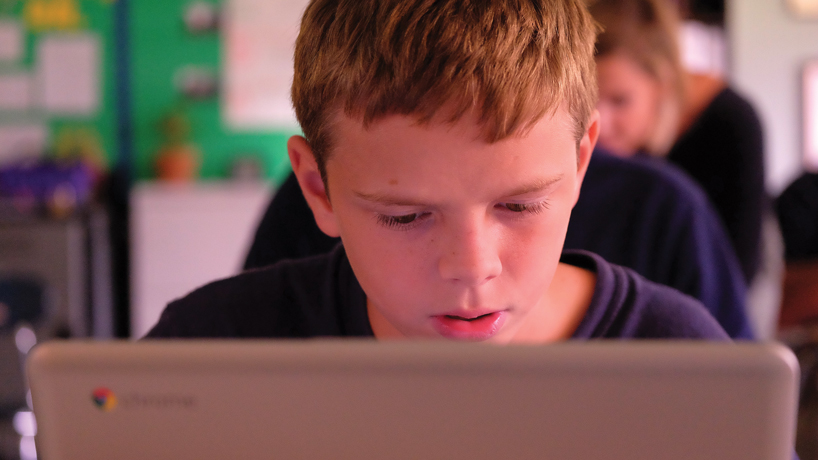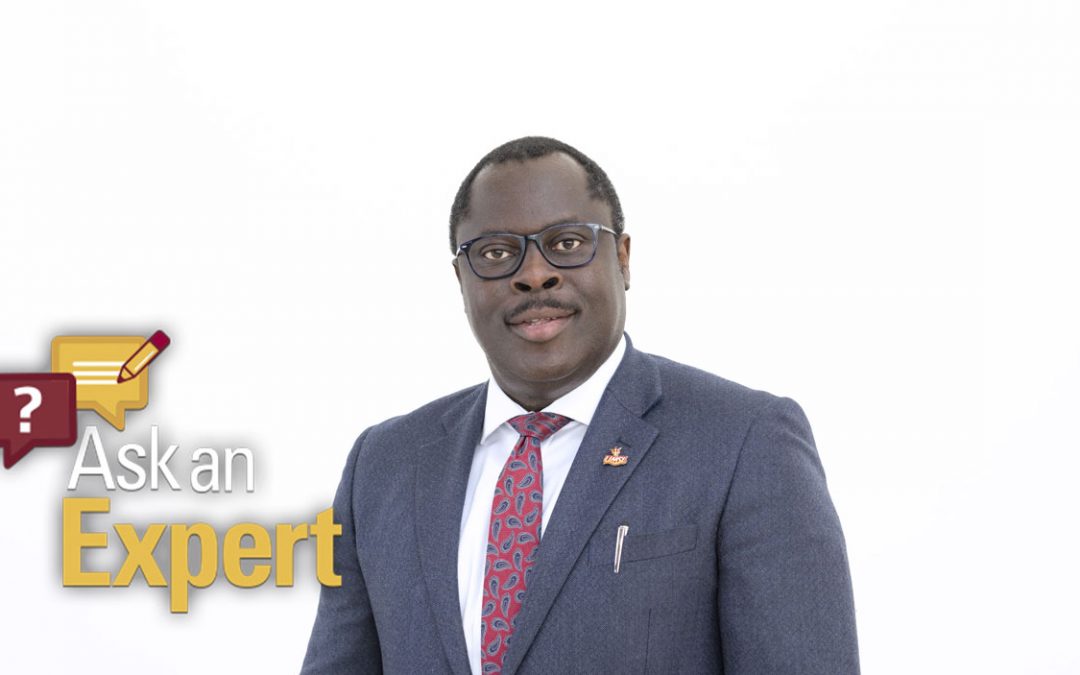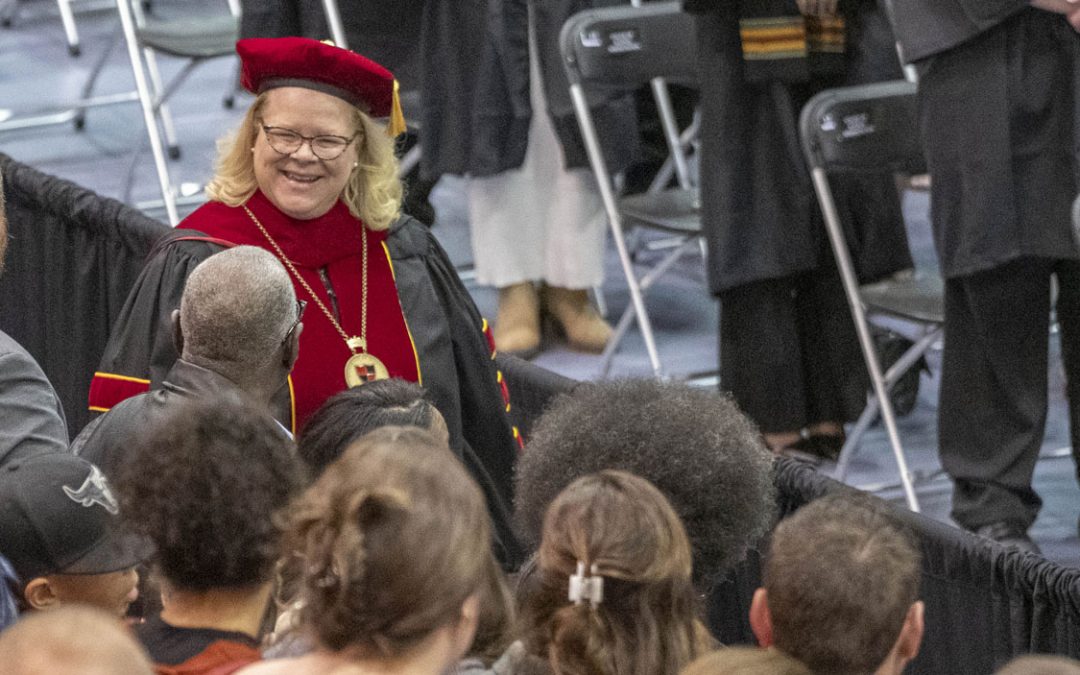
UMSL alumni Scott Osborne and Bob Shaw examined summer slide in their doctoral dissertation, “Using Online Interventions to Address Summer Learning Loss in Rising Sixth-Graders.” The educators found that students who regularly participated in weekly interactive lessons online saw noticeable academic gains rather than losses during the summer months. (Photo by August Jennewein)
Summer break is an American institution – nearly on the level of apple pie and baseball.
Despite the fun of ball games, barbecues and family vacations, the long break can be detrimental to young learners. The phenomenon is known as summer slide, or a loss of academic achievement, knowledge and skills during the break.
A recent study published in the American Educational Research Journal found that more than half of students lose an average of 39 percent of their total academic gains over the course of five summers in elementary school.
It’s something Scott Osborne and Bob Shaw, University of Missouri–St. Louis EdD graduates, have seen firsthand.
Osborne, a fifth-grade teacher at Meramec Elementary School in Clayton, Missouri, and Shaw, the JK-12 science department chair at Mary Institute and Saint Louis Country Day School in Ladue, Missouri, examined the issue in their doctoral dissertation, “Using Online Interventions to Address Summer Learning Loss in Rising Sixth-Graders.”
They studied a group of fifth-graders going into sixth grade during summer 2019, and the results were promising. Students who regularly participated in weekly interactive lessons online – where they received basic, immediate feedback and in-depth feedback from an instructor – saw noticeable academic gains rather than losses.
Research is continuing to confirm the initial findings, but the model could address a problem that’s persisted – in many cases quietly – for years.
“It impacts everyone,” Shaw said. “If you’re not paying attention to it, which is really easy in the summer, it can have a long-term impact. If you lose a month or two of your learning every year for 12 years, that’s a significant amount by the end, and you’re going to take that out in the workforce or college.”
The veteran educators began their research on the topic as part of an UMSL College of Education EdD cohort, STEM Education Enhancement. They have both taught math and science at multiple grade levels and were interested in developing their understandings of STEM as a comprehensive discipline.
Initially, they had different research interests. From the start, Shaw was interested in summer slide, and Osborne was interested in feedback models for students. Eventually, those interests converged.
“We started on two separate paths, really,” Osborne recalled. “Early in the second year, we came together and some of the research we had done for a different class got us going down this path of looking at a summer slide.”
They credit their dissertation committee members and mentors for the support and knowledge necessary to tackle the topic: Curators’ Distinguished Teaching Professor Charles Granger, Orthwein Endowed Professor for Lifelong Learning in the Sciences Keith Miller and Professor Emeritus Helene Sherman.
The pair decided to deliver two weekly lessons, one in math and one in science, over a 10-week period via the web app Go Formative. The study included students from two St. Louis County schools, who were given a basic skills assessment before and after the 10-week period.
The subjects were divided into four buckets based on how many lessons they completed: one or none, two to seven, eight to 14 and 15 to 19.
“The more lessons the students did, the greater improvement they had from pre to post,” Osborne said. “It was a very direct correlation.”
Students in the first two groups saw a small improvement, but the real gains came when they completed eight or more lessons. The third group showed an 8 percent increase in performance, while the last group – the most active – showed a 13 percent increase in performance.
Shaw noted that could mean improving a whole letter grade simply by having students invest less than an hour a week using a smartphone, tablet or computer to complete the review lessons.
The lessons were designed to refresh fundamental math and science skills but also to be interactive.
“All the lessons had a review aspect, so there was a video typically from YouTube or one of us jogging everyone’s memory about the concepts,” Shaw explained.
The interactive elements were meant to show students how the theoretical concepts they learned could be applied practically.
“There were some problems where they had to show modeling or draw diagrams to explain their concept,” Shaw said. “We also sent them outside to do stuff. We had them make sundials and take pictures, then explain the concepts of day and night or moon phases.”
Practice problems were auto-graded by the Go Formative software, so students received immediate feedback. Then, Osborne and Shaw provided deeper feedback on each lesson. They believe the combination of interactivity and regular, consistent feedback kept students engaged and encouraged them to complete more lessons.
That model contrasts with the summer work packets schools usually hand out at the end of the year. The packets often go unopened, and when they are completed, students rarely have the means to get their work graded.
“What we see in Clayton is, as students move up grade levels, fewer and fewer participate in those review packets,” Osborne said. “In first grade, we get about 80 percent of them back. In fifth grade, it’s like 23 percent.”
Osborne and Shaw posit continued engagement over the course of the summer was key to their positive results. They’re confident communication over the summer also jump-starts learning at the beginning of the school year.
“I think an added benefit to this is you get to see the teacher,” Shaw said. “You get to have an experience with the teacher before you get to your classroom.”
He added that it eliminates the “two-week get-to-know-the-teacher part.” It also gives teachers a chance to see where their students are at academically and adjust their lesson plans.
“That’s a huge change to how you start your year,” Osborne said. “You’re getting to know them a little better as these incoming students, but you also now have some data that you can use to guide how you start instruction, which is the most powerful piece. You want your teachers making decisions about instruction based on data that the kids have provided them.”
Osborne and Shaw are collecting data this summer as well, which they hope will replicate the original study. They expect an increased interest in the work, as the COVID-19 pandemic has brought summer slide into the spotlight.
Parents are beginning to worry that the move to remote learning in March will compound summer slide – especially for students who lack access to internet or those who don’t fare well without the structure of in-person classes.
Though shortening or getting rid of summer vacation might have been unthinkable previously, Osborne thinks the realities of schooling during the pandemic and the issues it has illuminated might make people reconsider.
“This is the moment,” he said. “This is the opportunity. I think we could easily motivate a lot of families to support a year-round model. After experiencing COVID-19, I really believe that our EdD program trained us to use research skills to seek and test a solution. That work has just begun.”
Neither Osborne nor Shaw can say what will happen for sure. However, they do know that any successful school structure will involve teachers meaningfully evaluating their students’ progress.
“You don’t have to just do these things online either,” Shaw said. “We would argue that the feedback has to be timely, and you have to do something with it. It needs to be targeted review, not just trying to get kids to do something – that we’re actually making sure they’ve learned the things we thought they were learning through the year. Those are the big takeaways for us. It’s really about feedback.”














